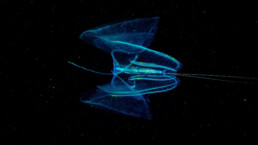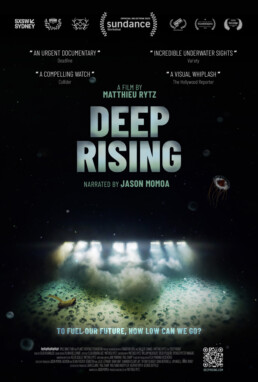Jason Momoa Narrates ‘Deep Rising,’ an Ecological Wake-Up Call
The seafloor is home to life forms that have existed since the beginning of time, why do we feel it is our right to steal their resources?
Ever since I became scuba certified last month, I have taken an even deeper interest in the health of our ocean and the well-being of the incredible creatures that call it home. The experience of existing underwater–even for just an hour–is unlike anything I’ve felt before. My senses became much more fine-tuned to the sights and sounds of this abundant, alien-like ecosystem, and I felt an unexpected connection to my pre-historic roots. Director Matthieu Rytz’s documentary Deep Rising calls our attention to the existential threats that face this beautiful landscape and arms audiences with information about the devastating reality that we are barreling toward if we don’t make major changes, fast.
Aquaman himself, Jason Momoa, lends his commanding voice to the film as he narrates throughout this ecological wake-up call. “We are tied to the ocean,” he says stoically. “It has always shaped human lives.” As humans have evolved throughout the centuries, we have learned how to adapt to our environment. In the case of Deep Rising, the problem we face today is the fact that we are pulling resources from the ocean without understanding its complexities and the cause and effect of such actions. The resources at hand are deep sea nodules containing highly sought-after metals. As capitalists discovered these nodules’ potential to become the new source of energy to fuel the earth and the economy, mining these rocklike objects became a top priority with little regard to how disrupting the ecosystem could have devastating effects.
Through fly-on-the-wall coverage, Deep Rising exposes the people and businesses behind the for-profit motives of greenlighting massive extractions of metals that are deemed essential to the electric battery revolution. The bigger picture that the film tries and lacklusterly succeeds in driving home is the fact that we should be developing alternative methods for harnessing energy that do not involve destruction, such as hydrogen. While Rytz has a justifiable cause for creating this film, the story itself is presented in a very dry manner. Footage from committee hearings, press conferences, and business pitches tend to come across as sterile and stand in stark contrast to the whimsical, effervescent sea life we’re lucky to get a peek at up close. There is creative respite in Ólafur Arnalds’ score, which is by far the standout of the film. The Icelandic composer creates a sense of icy foreboding with vast and deep notes along with consumer-friendly house music on a loop.
Deep Rising is an urgent geopolitical and scientific documentary that carries a strong message: the bottom of the seafloor is home to the most unimaginable life forms that have existed since the beginning of time, so why do we humans feel that it is our right to take their resources for ourselves? As Rytz elegantly states, “In order to address the climate crisis, we must protect the biodiversity of our ocean and as humanity is fast devouring the finite resources of our Blue Planet, we are witnessing the sixth mass extinction before our very eyes. While the world’s human population represents a minuscule 0.01 percent of all living things, our own body mass consists mostly of the primordial ocean and microbes. Protecting ocean biodiversity then, is not just about securing the future of turtles, dolphins, whales, and all the other amazing sea life we love and cherish. It is bigger than that. Because the biosphere does not belong to us; we belong to it.”
For fans of: Leviathan, Chasing Coral
Morgan Rojas
Certified fresh. For disclosure purposes, Morgan currently runs PR at PRETTYBIRD and Ventureland.


